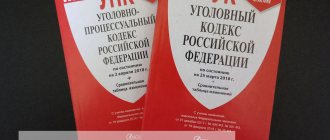In everyday life, by especially serious crimes we understand, as a rule, the most cruel and bloody acts, for example, murders, hostage-taking, terrorist attacks, etc.
However, from a legal point of view, the classification of crimes according to their severity does not depend on the actual content of the act, but on such a criterion as the size of the maximum punishment provided for by the relevant article of the Criminal Code of the Russian Federation.
In our article today, we will tell you which crimes are considered particularly serious from the point of view of criminal law, and perhaps, after reading this material, you will learn to define crimes yourself according to their severity.
Category of crimes of medium gravity
In accordance with Part 3 of Article 15 of the Criminal Code of the Russian Federation, illegal actions can cause harm to a citizen, expressed in moderate severity.
These crimes include:
- Deliberate actions of an attacker, for which he is punished as follows - imprisoned for a term of no more than 5 years.
- Actions of a citizen due to negligence, for which he will be forced to serve a sentence in prison for no more than 3 years.
Please note that the category of such crimes is grave. It may include actions performed by the offender accidentally or carelessly. But the intentional actions of an attacker can also be classified as a crime characterized as “serious.”
The category is usually determined by law enforcement agencies, and then they transfer information about the crime committed to the court for further consideration.
Serious crimes under the Criminal Code of the Russian Federation - what are they?
According to Art. 15 of the Criminal Code of the Russian Federation, all acts provided for by the Special Part of the Criminal Code of the Russian Federation are divided into crimes:
- low severity;
- moderate severity;
- heavy;
- especially severe.
More information about crime categories:
Categories of crimes in the Criminal Code of the Russian Federation by severity Read more
Serious crimes include:
- intentional crimes, the maximum punishment for which is over 5 years of imprisonment and up to 10 years inclusive;
- reckless crimes, the maximum penalty for which is 15 years in prison.
We wrote in detail about how intentional and careless acts are differentiated in the article on the elements of the crime in the “Subjective side” section:
The concept and meaning of the crime Read more
We invite you to read an interesting article from ConsultantPlus about serious careless crimes. If you don't have access to the system yet, you can get it for 2 days for free. Or order the current price list to purchase permanent access.
Since this classification is based on taking into account the nature of the circumstances of the committed act, Part 6 of Art. 15 of the Criminal Code of the Russian Federation allows the court to reclassify a crime from a serious crime to an act one level lighter (of moderate gravity), subject to the imposition of a punishment of no more than 5 years of imprisonment. On the application of this norm, see Resolution of the Plenum of the Armed Forces of the Russian Federation dated May 15, 2018 No. 10.
This information is current as of 2022.
Classification of crimes of medium severity
Crimes falling into this category can be divided into separate types depending on some important points and circumstances.
Let us list what crimes in this category can be and what is taken into account when determining punishment for these acts:
- Object of attack. It is imperative to determine who was harmed and what the nature of the social danger of the acts committed was. For example, a crime against life may be committed. It will not be considered in any way in the category of state or economic illegal actions.
- A form of guilt. Intent when committing a crime does not affect the category. It can be both direct and indirect. This gives rise to two types of such crimes. For example, in the first case, when the attacker consciously commits illegal actions and wants there to be dangerous consequences. And in the second case, for example, a citizen consciously commits any actions that will later lead to a crime, that is, he has a different goal.
- Contents of committed dangerous consequences. For example, they can take into account the time and repetitions of such acts - simultaneous, repeated crimes, as well as the degree of implementation - real damage caused, a threat, or a danger of causing them was created.
- Specific damage. A crime can be tangible or intangible.
- Method of committing a crime. The acts may be done by a group or individually, with deception, forcefully or not, with or without the use of weapons. The position in society of the person who committed the crime, whether he holds an official position, and whether he used his rights in the process of committing the act also influences.
The classification of crimes has both theoretical and practical implications. The division and classification of an action to a certain type is carried out taking into account all the factors and circumstances that existed at the time of the commission of this action.
Introduction
The relevance of the chosen topic is determined, first of all, by the state of crime and the fight against it in Russia at the present stage of development of society and the state. The classification of crimes formulated in the law, the elements of which are contained in various institutions of criminal law, is an effective tool for combating crime: the legislator uses categories of crimes when establishing the institutions of recidivism, unfinished crime, complicity in a crime; types of punishments such as fines, life imprisonment; rules for sentencing for a set of crimes; rules on probation, as well as on the abolition of probation, conditions for release from criminal liability and from punishment; features of criminal liability of minors. The widespread use by the legislator of various categories of crimes in the criminal law norms of these institutions makes it possible to study the requirements of the General Part of the Criminal Code of the Russian Federation in their interrelation and dynamics of development.
Examples of crimes of medium gravity and responsibility for them
We will give examples and indicate which articles of the criminal code are related to crimes of medium gravity and what punishment is provided for them.
| Crime | Article of the Criminal Code of the Russian Federation | Responsibility and punishment |
| The murder of a newborn child by a mother, even in a state of insanity. | 106 of the Criminal Code of the Russian Federation | — Restriction of freedom for 2-4 years. — Forced labor for up to 5 years. Imprisonment for 5 years. |
| A murder committed in a state of passion caused by violence, bullying, or immoral actions on the part of the victim. | Part 1 art. 107 of the Criminal Code of the Russian Federation | — Correctional labor for 2 years. — Restriction of freedom for 3 years. — Forced labor for 3 years. — Imprisonment for 3 years. |
| Murder of two or more persons committed in a state of passion. | Part 2 of Article 107 of the Criminal Code of the Russian Federation | — Forced labor for 5 years. — Prison for 5 years. |
| Murder committed while exceeding the limits of necessary defense. | Part 1 art. 108 of the Criminal Code of the Russian Federation | — Correctional labor for 2 years. — Restriction of freedom for 2 years. — Forced labor for 2 years. — Imprisonment for 2 years. |
| A murder committed by exceeding the measures necessary to apprehend the person who committed the crime. | Part 2 of Article 108 of the Criminal Code of the Russian Federation. | — Restriction of freedom for 3 years. — Forced labor for 3 years. — Imprisonment for 3 years. |
| Causing death by negligence. | Part 1 of Article 109 of the Criminal Code of the Russian Federation | — Correctional labor for 2 years. — Restriction of freedom for 2 years. — Forced labor for 2 years. — Imprisonment for 2 years. |
| Causing death by negligence due to improper performance by a person of his professional duties. | Part 2 of Article 109 of the Criminal Code of the Russian Federation | — Restriction of freedom for 3 years. — Forced labor for 3 years. They can add one more punishment to this - restriction in activities and prohibition from holding certain positions for the same time. — Imprisonment for 3 years. They may also impose the same ban on activities at the same time. |
| Causing death by negligence of two or more persons. | Part 3 of Article 109 of the Criminal Code of the Russian Federation | — Restriction of freedom for 4 years. — Forced labor for 4 years. — Imprisonment for 4 years. They may add restrictions on activities for 3 years. |
| Driving to suicide. | 110 of the Criminal Code of the Russian Federation | — Restriction of freedom for 3 years. — Forced labor for 5 years. Imprisonment for 5 years. |
| Intentional infliction of moderate harm to health, not dangerous to human life and not entailing the consequences specified in Art. 111 of the Criminal Code of the Russian Federation, but caused a long-term health disorder or a significant permanent loss of general ability to work by less than one third. | Part 1 of Article 112 of the Criminal Code of the Russian Federation | — Restriction of freedom for 3 years. — Forced labor for 3 years. — Arrest for six months. — Imprisonment for 3 years. |
| If the above act was committed: - In relation to two or more persons. — In relation to a person or his relatives in connection with the performance of official activities by this person or the performance of public duty. - In relation to a minor or other person, who is known to be in a helpless state by the perpetrator, as well as with special cruelty, humiliation or torture for the victim. — A group of persons, a group of persons by prior conspiracy or an organized group. - From hooligan motives. — For reasons of political, ideological, racial, national or religious hatred or enmity, or for reasons of hatred or enmity towards any social group. - Using weapons or objects used as weapons. | Part 2 of Article 112 of the Criminal Code of the Russian Federation | — Imprisonment for 5 years. |
| Causing serious or moderate harm to health in a state of passion. | 113 of the Criminal Code of the Russian Federation | — Correctional labor for 2 years. — Restriction of freedom for 2 years. — Forced labor for 2 years. — Imprisonment for 2 years. |
| Intentional infliction of grievous bodily harm, committed when exceeding the limits of necessary defense. | Part 1 of Article 114 of the Criminal Code of the Russian Federation | — Correctional labor for 1 year. — Restriction of freedom for 1 year. — Forced labor for 1 year. — Imprisonment for 1 year. |
| Intentional infliction of grievous or moderate harm to health, committed by exceeding the measures necessary to apprehend the person who committed the crime. | Part 2 of Article 114 of the Criminal Code of the Russian Federation | — Correctional labor for 2 years. — Restriction of freedom for 2 years. — Forced labor for 2 years. - Imprisonment for the same period. |
| Infliction of physical or mental suffering through systematic beatings or other violent actions, if this does not entail the consequences specified in Art. 111 and 112 of the Criminal Code of the Russian Federation. | Part 1 of Article 117 of the Criminal Code of the Russian Federation | — Restriction of freedom for 3 years. Forced labor for 3 years. - Imprisonment for the same period. |
| Coercion to remove human organs or tissues for transplantation, committed with the use of violence or the threat of its use. | Part 1 of Article 120 of the Criminal Code of the Russian Federation | — Imprisonment for 4 years. They may add a penalty in the form of a ban on activities for 3 years. |
| If the above act was committed against a person known to the perpetrator to be in a helpless state or in financial or other dependence on the perpetrator. | Part 2 of Article 120 of the Criminal Code of the Russian Federation | — Imprisonment for 5 years. They may add a penalty in the form of a ban on activities for 3 years. |
| Failure to provide assistance to a patient without good reason by a person obligated to provide it in accordance with the law or with a special rule, if this negligently resulted in the infliction of moderate harm to the health of the patient. | Part 1 of Article 124 of the Criminal Code of the Russian Federation | - Fine - 40 thousand rubles. or the amount of income for 3 months. — Compulsory work for 360 hours. — Correctional labor for 1 year. — Arrest for 4 months. |
Main part
The object of the study is social relations that make up the content of the institution of classification of crimes in criminal law.
The subject of the study is the theoretical provisions on the classification of crimes in criminal law, the set of criminal law norms regulating these social relations, as well as materials from judicial practice.
The purpose of the work is to study the issue of classification of crimes in Russian criminal law.
To achieve this goal, the following tasks are set:
— define the concept and meaning of the classification of crimes in criminal law;
— characterize the criteria for classifying crimes;
- reveal the content of the classification of crimes.
General issues and the essence of the classification of crimes are revealed in the works of modern Russian scientists such as P.V. Korobova, A.I. Martseva, O.A. Michal, G.V. Nazarenko, A.V. Naumova, V.V. Pitetsky and others.
The abstract consists of an introduction, three chapters, a conclusion and a list of references.
crime criminal punishment
Other practical examples related to crimes of medium gravity
We advise you to pay attention to such articles, but taking into account the conditions of Article 15 of the Criminal Code of the Russian Federation (we wrote about it above), since the criminal code can be edited and changed.
| 122(2,4), 123(3), 127(2), 128(1), 129(3), 134, 135, 136(2), 138(3), 139(3), 141(2), 142, 143(2), 144(2), 146(2), 147(2), 149, 150(1), 151(1,2), 152(1), 158(2), 159(1), 160(1), 161(1), 163(1), 165(2), 166(1), 167(2), 171, 171′(1), 172(1), 173, 174(1), 174′(1), 175(2), 176, 178(2), 181, 183(2,3), 184(2), 185(2), 188(1), 189(1,2), 191(1), 192, 193, 194(2), 195 (1,3), 198(2), 199(1), 201, 202, 203(1), 204(2.3,4), 207, 208(2), 213(2), 214(2), 215(1), 215′(2), 215!(1,2), 216(1), 217(1), 218, 219(1), 221(1), 222(1), 223(1), 228(1,5), 230(1), 232(1), 234(1,2), 235, 236(2), 237(2), 239(1), 240(1), 241, 243(2), 244(2), 246, 247(2), 248, 249(1), 250(2,3), 251(2,3), 252(2,3), 254(2,3), 256(3). 259, 260(2), 263(2), 264(2), 266(2), 267(1), 268(2), 269(1,2), 272(2), 273(1), 274(2), 280, 282, 283(1), 284, 285(1), 286(1), 287(1,2), 291(1), 292(2), 293(2), 294(3), 296(1,3), 298(3), 299(1), 301(2), 302(1), 303(2), 304, 305(1), 307(2), 309(2,3), 311(2), 312(2), 313(1), 318(1), 320(2), 321(1,2), 322(2), 322′(2), 323, 326(2), 327(2), 327(1), 330(2), 332(2), 333(1), 334(1), 335(1,2), 337(3,4), 340(1,3), 41(1,2), 342(2),343(2), 345, 346(2), 349(2), 350(2), 354 |
Premeditated crime
A premeditated crime is an action committed with intent (direct or indirect). Criminal offenses with indirect intent are actions committed by a person who was aware of their social danger, foresaw the onset of dangerous consequences, but did not want them to occur or was indifferent to them.
A crime of the Criminal Code with direct intent is actions that a citizen committed, realizing a public threat, foresaw the inevitability or likelihood of the occurrence of generally dangerous consequences and desired them.



